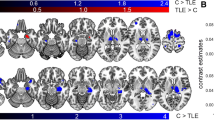Abstract
There is increasing evidence from both experimental and clinical studies that some types of epilepsy, particularly mesial temporal lobe epilepsy, are progressive disorders. Progressive features may be characterized by more frequent or more severe seizures, leading to development of chronic epilepsy with decreased responsiveness to treatment with antiepileptic drugs. The individual factors determining whether an epilepsy exhibits progressive features or not are not known in sufficient detail. By using of sensitive neuroimaging techniques, it was recently shown that prolonged or frequent seizures, if not pharmacologically suppressed, can progressively induce lesions in the brain. Experimental studies demonstrated that the repeated occurrence of seizures induces a variety of morphologic and functional changes in the brain which most likely underlie the chronicity of epilepsy. From these observations one may conclude that early pharmacological suppression of seizures after onset of epilepsy reduces the risk of development of chronic epilepsy. However, both experimental and clinical data indicate that epilepsy may chronify despite early treatment, meaning that currently available antiepileptic drugs do not prevent progression of epilepsy. A major goal in future epilepsy research is the enhanced understanding of factors that determine whether epilepsy will or will not exhibit progressive features in a given patient. Various patient-related, disease-related and treatment-related factors are currently discussed in this respect. It remains to be determined whether better understanding of such factors will allow a more rational development of antiepileptic drugs which treat epilepsy and not only its symptoms.
Zusammenfassung
Zahlreiche experimentelle und klinische Daten zeigen, dass einige Epilepsieformen, v. a. die mesiale Temporallappenepilepsie, progredient verlaufen können, das heisst, die Erkrankung nach erster Diagnose (durch das spontane Auftreten von Anfällen) im Schweregrad zunimmt, sich chronifiziert und u. U. pharmakoresistent wird. Die Faktoren, die entscheiden, ob eine Epilepsie bei einem Patienten progredient verläuft oder nicht, sind weitgehend unbekannt. Mit Hilfe sensitiver Imaging-Verfahren konnte bei Patienten gezeigt werden, dass lange oder wiederholt auftretende, nicht medikamentös unterdrückte Anfälle zu progressiv zunehmenden Läsionen im Gehirn führen können. In tierexperimentellen Studien wurde gezeigt, dass das wiederholte Auftreten von Anfällen zu einer Vielzahl von morphologischen und funktionellen Hirnveränderungen führt, die mit großer Wahrscheinlichkeit für die Chronifizierung einer Epilepsie von Bedeutung sind. Daher ist anzunehmen, dass eine möglichst rasche Anfallsunterdrückung das Risiko der Entstehung einer chronischen Epilepsie mindert. Sowohl experimentelle als auch klinische Beobachtungen sprechen aber auch dafür, dass es zu einer Chronifizierung einer Epilepsie trotz Anfallsunterdrückung kommen kann, die zur Zeit verfügbaren Antiepileptika also die Progression einer Epilepsie nicht verhindern. Ein wichtiges Ziel der Epilepsieforschung der nächsten Jahre ist daher die Aufklärung der Faktoren, die entscheiden, ob eine Epilepsie bei einem Patienten progredient verläuft oder nicht. Zahlreiche Patienten-bezogenene, Epilepsie-bezogene und Behandlungs-bezogene Faktoren werden zur Zeit diskutiert. Es bleibt abzuwarten, ob auf der Basis dieser Faktoren eine rationalere Entwicklung von Antiepileptika, die die Epilepsie behandeln und nicht nur die Anfälle, möglich sein wird.
Similar content being viewed by others
Notes
Kurzreferat eines Vortrages, der auf der 43. Jahrestagung der Deutschen Sektion der Internationalen Liga gegen Epilepsie am 5. April 2003 in Berlin gehalten wurde.
Author information
Authors and Affiliations
Corresponding author
Additional information
Rights and permissions
About this article
Cite this article
Löscher, W. Ist Epilepsie eine progrediente Erkrankung?. Z Epileptol 16, 207–213 (2003). https://doi.org/10.1007/s10309-003-0029-1
Received:
Accepted:
Issue Date:
DOI: https://doi.org/10.1007/s10309-003-0029-1




